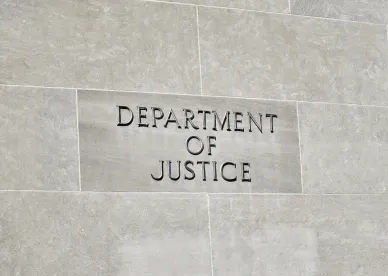The Department of Justice Criminal Division has clarified its policy on the Department’s assessment of a company’s claim that it cannot afford to pay a criminal fine in a memorandum issued on October 8, 2019. Criminal Division department head Brian Benczkowski had previewed the memorandum during a speech in September.
While the DOJ already permitted corporate defendants to seek reduction of criminal fines, the Benczkowski memo sets forth more specific guidelines on the factors that will support a claim for fine reduction, signaling efforts to make the criminal fine assessment procedures more transparent. The Benczkowski memo is particularly useful, considering the Federal Sentencing Guidelines on corporate criminal fines can be confusing and vague. The defense often has difficulty determining what facts it must demonstrate to establish a company’s inability to pay.
The Federal Sentencing Guidelines permit reduction of criminal fines if a company is unable to pay the fine, even on installment (aka, a corporate poverty claim). Before asserting an inability to pay, the company and the government must agree on what the fine should be under the law, notwithstanding the company’s finances. Then, companies seeking to establish an inability to pay must complete an 11-question questionnaire on the company’s finances, including assets and liabilities, current and anticipated cash flow, and working capital needs.
Criminal Division attorneys use the responses when applying the statutory sentencing factors (18 U.S.C. § 3572(a) & (b)), the Federal Sentencing Guidelines (U.S.S.G. § 8C2.2 & 8C3.3), and the Justice Manual’s principles on consideration of collateral consequences in corporate criminal cases. Footnote four of the Benczkowski memo confirms that Criminal Division attorneys may adjust a proposed fine based on a significant adverse collateral consequence, even if that consequence might not threaten the organization’s viability. Significantly, the Benczkowski memo identifies adverse collateral consequences deemed relevant and irrelevant to the assessment of a company’s inability to pay claim.
Relevant collateral consequences include the company’s ability to fund pension obligations or provide the amount of capital, maintenance, or equipment required by law or regulation. Additionally, Criminal Division attorneys may consider whether the proposed monetary penalty is likely to cause layoffs, product shortages, or significantly disrupt competition in a market.
Collateral consequences generally deemed irrelevant include adverse impacts on growth, future opportunities, planned or future product lines, future dividends, unvested or future executive compensation or bonuses, and planned or future hiring or retention.
While Criminal Division attorneys have significant discretion to reduce a company’s criminal fine or monetary penalty, it is subject to certain limitations. The Benczkowski memo mirrors the language of both the statutory sentencing factors and Federal Sentencing Guidelines in checking this discretion. Attorneys may only recommend an adjustment to the monetary penalty to the extent necessary to avoid (1) threatening the continued viability of the organization and/or (2) impairing the organization’s ability to make restitution to victims.
Benczkowski explained that the clarified guidelines are meant to promote transparency and incentivize corporate compliance. Generally, members of the defense bar have acknowledged the DOJ’s movement toward transparency and welcomed the new guidance. If a company receives a reduction in fines, the reasons for granting it will likely be in the settlement, offering other companies insight into what may qualify as a “significant collateral consequence” for the purposes of fine reduction. Ultimately, the Benczkowski memo and the DOJ policy contained therein signals a new era of cooperation, providing relief to companies facing financial ruin in the face of steep criminal fines, while incentivizing cooperation and compliance with the Criminal Division.



 />i
/>i

